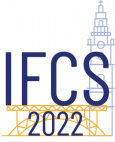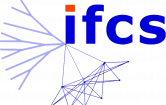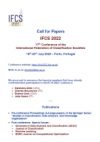SUBMISSIONS
Submission of an article for the Proceedings
Manuscripts submitted for IFCS 2022 Proceedings should be prepared using the IFCS2022 Paper Template (here) that is provided. Note that a manuscript should be between 6 and 8 pages long, references included. Please read the instructions and follow the guidelines very carefully. Submissions not complying will not be considered. Do not include new user-defined Latex commands, nor any personal macros, as they would affect the global compilation.
Figures should be provided in pdf, eps or jpg.
For each submitted manuscript, a separate Abstract should be provided using the IFCS2022 Abstracts Template (here).
Please rename your files with the name of the first author.
Submissions should be made as a ZIP file, gathering :
- Manuscript Latex file
- Manuscript PDF
- Manuscript figures
- Abstract Latex file
- Abstract PDF
Submission of an Abstract
(without submission of article to the Proceedings)
Single Abstracts submitted for IFCS 2022 should be prepared using the IFCS2022 Abstracts Template (here). Note that an Abstract should be maximum one page long, including possible references. Please read the instructions and follow the indications very carefully. Submissions not complying with the guidelines will not be considered. Do not include new user-defined latex commands, nor any personal macros, as they would affect the global compilation.
Please rename your files with the name of the first author.
Submissions should be made as a ZIP file, gathering :
- Abstract Latex file
- Abstract PDF
CONFERENCE TOPICS
• Big Data
• Biplots
• Clustering, Classification and Discrimination
• Compositional Data Analysis
• Computer Graphics and Visualization
• Data Science
• Data Science Education
• Data Streams
• Databases and Data Management
• Deep Learning
• Dependence Modelling and Copulas
• Dimension Reduction
• Formal Concept Analysis
• Functional Data Analysis
• Generalized Linear Models
• Image Analysis and Computer Vision
• Information-theoretic Statistical Modelling and Model Selection
• Knowledge Representation and Discovery
• Machine Learning
• Mathematical Foundations of Data Science
• Matrix Factorization
• Meta-learning
• Missing Data Handling
• Model-based Clustering
• Modelling High-Dimensional and Complex Data
• Natural Language Processing
• Optimization in Classification and Clustering
• Pattern Recognition
• Robust Methods
• Social Network Analysis
• Spatial Data Analysis
• Statistical and Econometric Methods
• Statistical Learning and Data Mining
• Symbolic Data Analysis
• Text Mining
• Time Series Analysis
• Web Mining
WITH APPLICATIONS IN
• Archaeology
• Astronomy
• Biology
• Business and Management
• Economics
• Education
• Engineering
• Finance
• Geosciences
• Industry
• Linguistics
• Marketing
• Medicine and Health Care
• Musicology
• Psychology
• Risk Management
• Social Sciences


